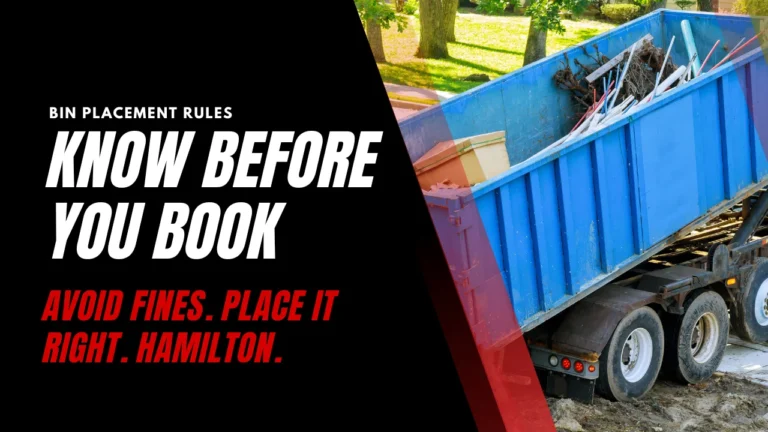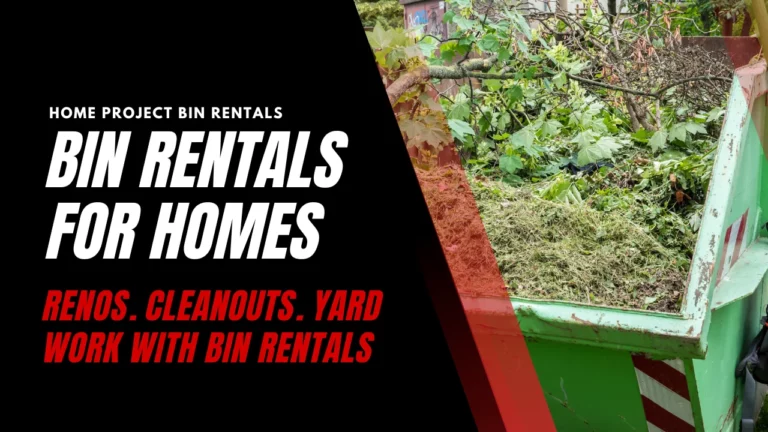Most people renting a bin for the first time don’t realize there are rules involved and, in Ontario, bin rental rules can vary quite a bit depending on the city. Depending on where you live and what kind of project you’re doing, there may be restrictions around where the bin can go, what you can throw in it, and how full you’re allowed to load it.
It sounds like a headache, but it doesn’t have to be. At E.N Contracting & Disposals, we handle this every day across Hamilton and surrounding areas. We know the local rules and can flag problems before they happen, so you’re not stuck with extra fees, delays, or unwanted attention from bylaw officers.
Bin rentals come with rules, but we’ll help you navigate them.
1. Bin Placement Rules: Driveway vs. Street
The easiest and most common spot to place a bin is your driveway. As long as it fits and doesn’t block sidewalks or fire routes, placing a bin on your own property is usually fine. That’s the cleanest option, especially for short-term projects like weekend cleanouts or roofing tear-offs.
The moment your bin ends up on public property, like a curb, road, or alley, you might need a permit. In Hamilton and Burlington, for example, a dumpster permit is often required for bins that go on the street, especially in tight residential areas or near schools and businesses. For detailed information on Hamilton’s permit requirements, refer to the city’s guidelines on Temporary Lane & Sidewalk Occupancy Permits. This helps the city keep traffic moving and sidewalks walkable because no one wants to swerve around a dumpster at 8 a.m.
Some customers are surprised to learn their bin can’t just be half on the driveway and half on the road. Even a few inches over the sidewalk line can be enough to trigger a bylaw complaint. We get asked all the time, “Can I put a bin on the street?” The answer depends on your city and whether a permit is in place.

We’ll flag these risks ahead of time so you don’t get stuck dealing with it mid-project.
Not sure what size bin will actually fit on your property? Check our Bin Rental Size Guide for dimensions and tips.
Even if you’re not ready to book, we’re happy to take a look at your layout over the phone and let you know if a permit might come into play.
2. Bin Rental Permits: When You Need One and What It Covers
Permits are required whenever a bin is placed on public land, including: streets, sidewalks, boulevards, and laneways. Most municipalities have rules about how long a bin can stay out, how much space it takes up, and what kind of safety markings it needs. These municipal bin bylaws are enforced differently across Ontario, which is why it helps to have someone familiar with the local process.
That’s what the permit covers.
You apply for a permit through your local city hall or municipal website. Some cities make it easy with an online form; others require you to call in or visit an office. Either way, you’re responsible for getting the permit, but we’ll help flag the need for one when we confirm your order.
For example, in downtown Hamilton, a customer recently needed a 14-yard bin for a rowhouse reno. Because they had no driveway, the bin had to go on the street. We helped them submit the permit request to the city and timed the drop-off to align with the permit window. No fines, no angry neighbours—just drywall in, drywall out.
We stay up to date on dumpster permit rules in Ontario so our customers don’t get caught off guard by city-specific requirements.
Wondering how bin size or rental duration affects price? Use our Bin Rental Cost Calculator to get a ballpark quote based on your project.
What Happens If You Skip the Permit?
It’s tempting to just “risk it” and hope no one says anything but that usually backfires.

If a bylaw officer spots an unpermitted bin on public property, they may issue a fine or demand immediate removal. Understanding the Property Use By-laws in Hamilton can help you avoid such penalties. In some cases, your project hits the brakes and no one’s getting paid while the bin sits in limbo.
One contractor we worked with in Stoney Creek had a crew ready to demo an old kitchen, but the bin they ordered through another company got pulled off the street due to a missing permit. That mistake set them back two days and cost them extra labour. Avoid the scramble. We’ll catch it before it causes trouble.

3. What You Can and Can’t Put in a Bin in Ontario
Not everything can go in a rental bin and if you’re wondering what can’t go in a bin, the list of bin restrictions in Ontario is longer than most people think.
We’re not being picky. Ontario’s landfill and transfer station rules are strict, and we’re required to follow them.
Disposing of banned materials can cause environmental issues, contaminate loads, or result in a rejected dump. When that happens, the cost, and the cleanup, falls back on you.
If you’ve been Googling what can’t go in a dumpster, here’s a good place to start.
Prohibited Items Include:
- Paint (even if dried)
- Propane tanks and fuel containers
- Tires and car parts
- Fridges and freezers (anything with coolant)
- Electronics (TVs, computers, etc.)
- Household or industrial batteries
- Any kind of chemical or hazardous waste
Most of these items require special disposal methods through city-run programs or hazardous waste facilities. If you’re not sure where to take something, we’re happy to point you in the right direction.

Not Sure About an Item?
Better to check now than be charged later. We’re here to help. If something seems borderline, like leftover flooring adhesive, oil-soaked rags, or an old laptop, just give us a call. We’d rather clear it up in five minutes than hit you with a surcharge or reload request later.
One homeowner once tossed a half-used paint can into a bin with clean renovation debris. It cracked open during pickup and soaked part of the load, triggering a $150 contamination fee at the dump. Nobody wants to pay that for a $10 mistake.
If you wouldn’t throw it in your municipal garbage without checking, don’t throw it in your bin without asking.
4. Bin Weight Limits & Overfill Restrictions
Every bin has two main limits: weight and fill height. Go over either one and you may run into problems during pickup or get charged extra.
Weight is especially important with things like drywall, shingles, tile, and soil. Even a half-full 10-yard bin can tip over the limit if it’s loaded with dense materials. Each bin comes with its own weight allowance — see the breakdown by size here.
The fill height is just as crucial. If material is sticking up past the rim, even light stuff like insulation or plywood, our drivers can’t safely tarp it and transport it. In some cases, they’ll refuse pickup until it’s reloaded properly. That slows your project down and costs more in the end.

We’re publishing a full breakdown of overfill penalties soon, but for now, here’s the takeaway: if you’re in doubt, snap a photo and send it to us before pickup. We’ll tell you if it’s good to go.
5. Regional Variations: Ontario Bin Rental Rules Aren’t Always the Same
Not all bin rental rules in Ontario are province-wide. What’s okay in Hamilton might not pass in Brantford or Mississauga. Ontario bin rental permit rules vary from city to city. Every municipality has its own rules and that matters a lot if you’re a contractor working across regions.
We’ve helped clients in Ancaster avoid fines by flagging alleyway clearance issues before delivery. We’ve also adjusted bin placement strategies in Waterdown, where steep driveways and tight turns can make access tricky. These aren’t one-size-fits-all situations and we don’t treat them like they are.
That’s why our team keeps up with permit and placement requirements across Hamilton and surrounding communities. Whether you’re clearing out the garage or juggling five job sites, we’ll keep your bins on the right side of the rules.
Unsure About the Rules? We’ll Walk You Through It
You don’t need to memorize municipal bylaws or become an expert in waste regulations. That’s our job.
When you book a bin with E.N Contracting & Disposals, we:
- Check if a permit is needed based on your location and setup
- Flag any material or item that might be restricted
- Confirm weight and fill limits so you’re not hit with surprise charges
- Help you choose the right bin for the job, the property, and your budget
- Give you real-time guidance if you hit a snag mid-project
It doesn’t matter if you’re a homeowner doing your first reno or a contractor balancing multiple sites, our team is here to make it easier. We’ve been through every kind of situation, mess, and bylaw scenario, so we’ll help you avoid the common mistakes that cost time and money.
Got a tricky setup or odd request? We’ve probably seen it. Call us and we’ll figure it out.




